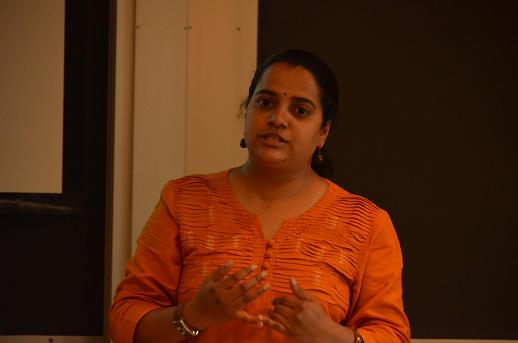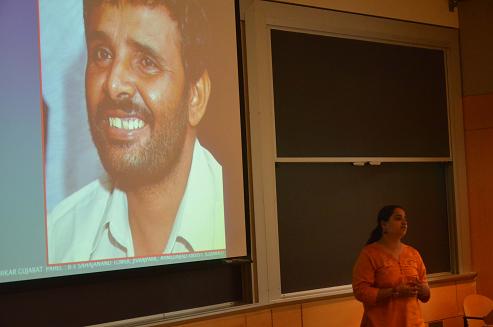Contribute
| Transforming Lives Through The Right To Information |
Press Release
07/11/2012
Pankti Jog, the Advocacy Coordinator for Janpath and the Mahiti Adhikar Gujarat Pahel (MAGP) groups, addressed a crowd of about 30 people at the Massachusetts Institute of Technology (MIT) on June 17. Her talk, organized by the MIT and Boston chapters of Association for India's Development (AID), covered Janpath’s and MAGP's advocacy work with Right to Information (RTI) primarily in the state of Gujarat. RTI is a powerful act passed by the parliament of India in 2005, allowing the common citizen to inquire about any government related information and activity. “Of the over 14,000 acts that have been passed in India in the past 50 years, the beauty of the RTI act is that it is so accessible, that it can be used by the common citizen without requiring any assistance from a lawyerâ€, Jog noted. During her early years with Janpath, Jog was working with communities affected by the earthquake of 2001 in the Kutch region of Gujarat. Jog saw first-hand how funds gathered for and allocated towards relief and rehabilitation work, were misappropriated at every level of bureaucracy. This led to Jog getting involved with the RTI movement.
In 2006, MAGP launched the first legal RTI helpline in India, as a support system for citizens to raise awareness and provide help in filing RTI applications. Today it has answered over 100,000 calls, many of which Jog has personally responded to. Jog recounted several success stories in her talk. One example was of a blind man named Ratna of the Rajkot district, who after walking precariously for many years on the badly-constructed village road, called the RTI helpline to get help filing an application to get information on how much funds were allocated and used towards the building of the road. Within weeks, the work was restarted and the road rebuilt. Today Ratna is an expert on RTI (owing in a large part to the availability of RTI material in braille) and has filed over 50 applications, leading to many changes in his village. He has held RTI clinics to benefit his village people, and now serves as the village deputy sarpanch (elected village head). “Our focus is to create more leaders like Ratna Bhai who can take this act and become empowered to bring about positive changeâ€, proclaimed Jog.
Noteworthy as well, is Janpath's “RTI On Wheels†grassroots initiative which was established in 2008. This is India's first mobile multi-media legal clinic van that has traveled to over 4000 villages in 18 states, reaching over 550,000 villagers, spreading the word on RTI and helping villagers file RTI applications right on the spot. “Pankti's work in empowering common people through deployment of a mobile van is fabulous,†exclaimed Maulik Nagri, one of the attendees at the talk. “Her work gives us a model to make RTI more accessible, scalable and implementable." Recognizing the enormous potential of this venture to bring RTI to the masses, AID supported the alteration and redesign costs for the vehicle. The mobile campaign's success has led to several states considering the adoption of a similar program.
Jog also shed light on her advocacy work for the Agariya nomadic tribe who mine salt from the water beneath the desert in the Little Rann of Kutch region in Gujarat. Eight months out of the year, the Agariyas travel there, setting up makeshift homes, with no access to potable water nor health-care. With barely any diversity in available vegetation, vitamin deficiencies and low haemoglobin counts are common amongst the population. Although this salt-making practice has been in existence for over 600 years, the community still only gets around 23 paise for a kilo of salt, while that same kilo sells for over Rs 15 in the market. More than 50% of the community is illiterate, and are thus exploited by traders. Jog referred to it as “bonded laborâ€. In a situation where the Indian government has failed to step in, AID in collaboration with Janpath has been working with the Agariya community to educate them on their rights, and has set up desert schools so that their children can have limited interruption in their education due to the frequent migration. “It was apparent from Pankti's talk that no matter how good a legislation is, without a very strong grassroots movement, it is not guaranteed to benefit the marginalized sections of the societyâ€, said AID-Boston volunteer and Development Coordinator, Somnath Mukherji.
It is such a relentless pursuit for rights of the marginalized that makes Jog’s work so important. It is in recognition of this crucial struggle that AID has continuously endeavored to support her.
For more information on Janpath and MAGP’s work, go to http://www.janpathnetwork.org and www.mahitiadhikar.blogspot.com, respectively.
More on AID can be found at http://www.aidindia.org.
You may also access this article through our web-site http://www.lokvani.com/

